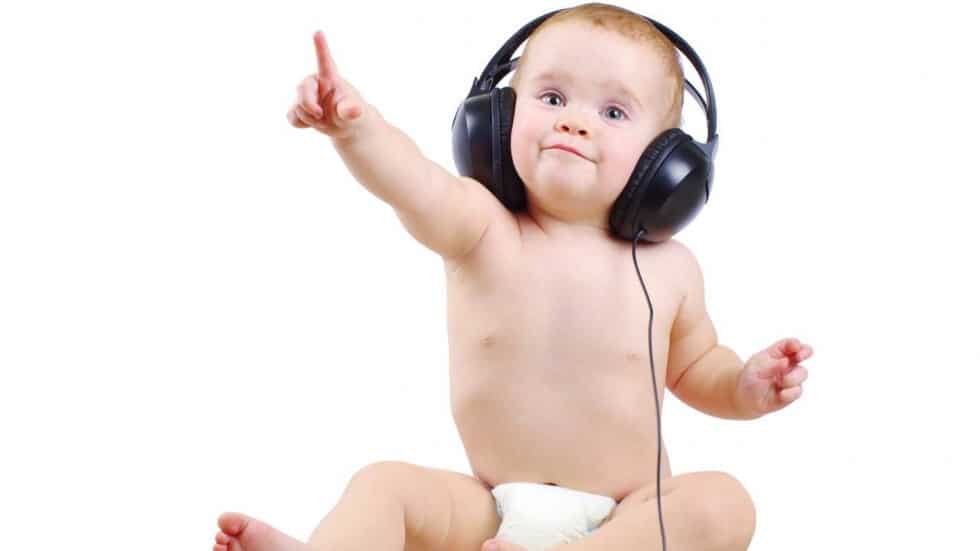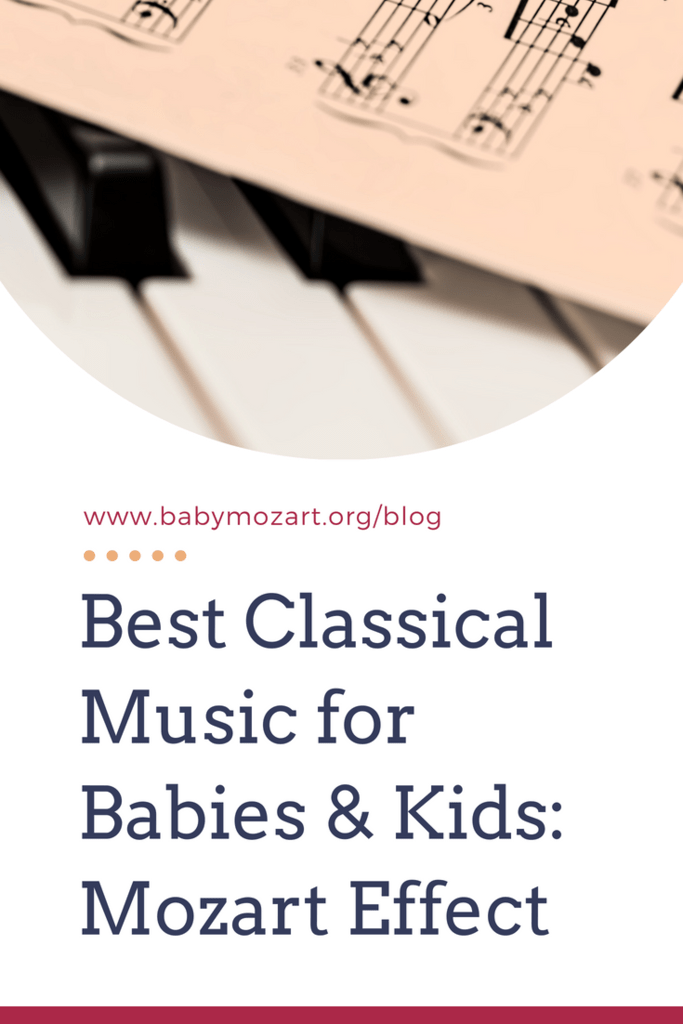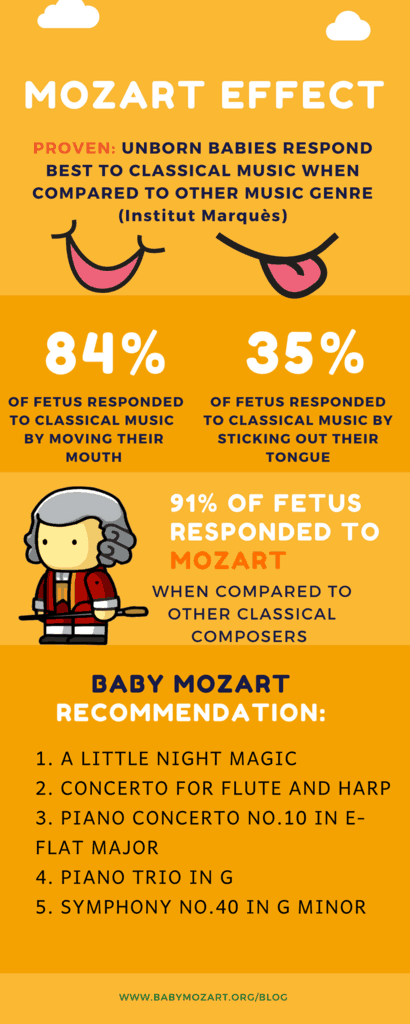
Best Classical Music for Babies and Kids: Mozart Effect and Baby Mozart Recommendations
What is Mozart Effect?
The Mozart effect was first described by French researcher Dr. Alfred A. Tomatis in his 1991 book Pourquoi Mozart? (Why Mozart?). His work analyzed the effects of classical music for babies and children, in particularly Mozart’s music on children who suffer from communication and speech disorders. Dr. Tomatis’ findings of the Mozart Effect was so successful that hundreds of centers had been established in the 1990s to help children with Mozart’s Baroque music.
Two years after the Mozart Effect became well-known for its benefits in dealing with cognitive education for small children and those who suffer from disorders like dyslexia, autism, ADD, mental disorders, listening disorders, etc., a research article published in the journal Nature by Rauscher et al. done on adults once again sparked real media and public interest about the idea that listening to classical music somehow improves brain functioning. The research claimed that listening to Mozart’s sonata for two pianos for 10 minutes, normal subjects showed significantly better spatial reasoning skills than after periods of listening to relaxation instructions designed to lower blood pressure or silence. The mean spatial IQ scores were 8 and 9 points higher after listening to the classical music than the other two conditions.

Does classical music make babies and kids smarter?
Today, parents often hear about theories that playing classical music for babies and kids, and even developing fetuses during pregnancy, can increase your baby’s brainpower and hence making babies smarter. The term Baby Mozart Effect has thus emerged. But is Baby Mozart Effect real? And does it have to be Mozart music? Do other types of classical music work?
Is Baby Mozart Effect real?
The answer is maybe. In animal studies, rats who listened to Mozart before and after birth were able to find their way to the end of a maze more quickly than those that didn’t. And numerous studies have uncovered that if children are exposed to classical music from an early age it can help build their neural pathways. Those pathways are directly responsible for spatial, memory and language development. Other studies have shown students exposed to Mozart’s music prior to testing were able to score better marks than those who weren’t.
However, although much research has gone into studying the benefits of brain development when playing classical music for babies and children, study results have been conflicting and controversial. While some researchers found it to be real, others dismissed it and argued that even if it has benefits, they are short-term benefits only and have no effects on long-term brain development.
Although it is still inclusive whether listening to classical music can make babies and kids smarter, it is generally agreed upon by academics and parenting experts that exposure to classical music early in life and early childhood music education is beneficial to children’s brain development. Several long-term studies on the effects of classical music on babies and children were conducted in groups of pre-school children aged 3-4 years who were given keyboard music lessons for six months, during which time they studied pitch intervals, fingering techniques, sight reading, musical notation and playing from memory. At the end of training, all the children were able to perform simple melodies by Beethoven and Mozart. When they did they were then subjected to spatial-temporal reasoning tests calibrated for age, and their performance was more than 30% better than that of children of similar age given either computer lessons for 6 months or no special training.
Does it have to be Mozart music?
Mozart’s music is found to assist both the left and right brain. Scientists believe that when we listen to Mozart, we enjoy an increased sense of intuition and concentration, and thus organizing neuron firing patterns in our cerebral cortex to boost our brain power.
However, it doesn’t have to be Mozart. In fact, any classical music with around 60 beats per minute can accelerate learning. Baroque music is also found to enhance our memory – both short and long-term. So as far as classical music goes, you can experiment with different composers to find the music that speaks to your heart. Depending on the intensity of the music some compositions are better suited for babies and young children, which we will outline below.
Benefits of playing classical music for babies and kids
1. Improve physical and mental health
When we play classical music for babies and kids, their heartbeat slows down, blood pressure decrease, and fast brain waves slow down by about 6% and fast brain waves increases as much. This allows for synchronization of both brain hemispheres, resulting in alert relaxation. The calming effect of classical music upon human mind and body helps your baby sleep better and thus resulting in better physical health and brain development. Also, a lot of parents of autistic children have seen tremendous results with their kids after exposing them to Mozart’s music for a lengthy period of time each day; the kids become more responsive to their direct environment and even made eye contact with others!
2. Improve language development
There’s a strong correlation between classical music and language development. Young children that listen to classical music might learn to talk and to read faster. They may also develop better memories and listening skills, which are vital to learning a language.
3. Happier babies and children
Classical music has a unique ability to uplift a person’s mood. A study by the American Music Therapy Association showed that listening to classical rhythms stimulate the production of endorphins or natural relaxants in the brain. This improves the mood and relaxes the body. This calming effect can lead to improved mental health and increased learning abilities.
What kind of classical music is good for babies and kids?
There are many different kinds of classical music available out there, some are appropriate for babies and young kids, some are not. Classical music that is loud and violent in nature should be avoided. Parents should be careful in choosing classical music for babies and kids because some classical compositions could overstimulate or bore children.
The key to choosing the right kind of classical music for babies and kids include:
- choose orchestral works that are short, melodic, and upbeat as babies and kids have a short attention span
- choose songs that have a steady and regular rhythm to it as music without a steady rhythm can stimulate children, but it will not relax them or encourage their brain development.
- Choose simple and easy work as orchestral works and operas are often too complex for babies and young kids to understand. Works with no vocals and only one or two instruments work the best.
How to harness the power of classical music for babies and kids?
An easy way to harness the power of classical music for babies and kids is through sleep learning, meaning they can use classical music to program their brains while they sleep. It has been scientifically proven that while we sleep, we can capable of absorbing complex information. So go ahead and play some calming classical music when your baby is asleep.
A secondary way to harness classical music is to play classical music to your child to wind down before bedtime. This will help them relax and get better sleeps at night.
Top 10 Baby Mozart Classical Music Recommendation for Babies and Kids – All Time Favorites
- French Suite No.5 in G Major by Johann Sebastian Bach
- Fur Elise, Bagatelle No. 25 in A minor by Ludwig van Beethoven
- Moonlight Sonata Op.27 No. 2 by Ludwig van Beethoven
- Sonata Pathetique by Ludwig van Beethoven
- Clarinet Quintet in B minor by Johannes Brahms
- Concerto for Flute and Harp by Wolfgang Amadeus Mozart
- Piano Concerto no.10 in E-flat Major by Wolfgang Amadeus Mozart
- Piano Trio in G by Wolfgang Amadeus Mozart
- Canon and Gigue in D Major by Johann Pachelbel
- Swan Lake Op.20 by Pyotr Ilyich Tchaikovsky
You can download mp3 of the above classical music for babies and kids for free on our website and app.
Best Classical Music for Baby Relaxation and Better Sleep
- Air on the G String–J. S. Bach
- Polovtsian Dances Prince Igor–Borodin
- The Four Seasons, spring, summer, winter–Antonio Vivaldi
- Adagio for Strings–Samuel Barber Symphony No. 9, 1st movement–Dvorak
- Romeo and Juliet Fanatasy Overture–Tchaikovsky
- Clair de lune–Debussy
- Nocturnes or Preludes–Chopin
- Rhapsody On A Theme Of Paganini, Op. 43 (the 18th Variation is everyone’s favorite)– Rachmaninoff
- Gymnopedies (3) for Piano–Eric Satie
- Canon in D–Pachabel
- Peer Gynt Suite: Dawn–Grieg
- Unaccompanied Cello Suites, especially the Prelude to Cello Suite No. 1 in G–Bach
Best Classical Music for Play Time
- Flight of the Bumblebee Rimsky-Korsakov
- Bolero–Ravel The Barber of Seville, overture–Rossini
- Symphony No. 5 in c minor–Beethoven
- Peer Gynt Suite, No. 1, In the Hall of the Mountain King–Edward Grieg
- Etudes–Chopin
- Piano Concerto in F–Gershwin
- Rhapsody in Blue–Gershwin
- Entry of the Gladiators (Einzug der Gladiatoren)
- March for orchestra, Op. 68— Fucik
- William Tell Overture: Finale – Rossini
- Gayaneh (Sabre Dance) – Aram Khachaturian
- Swan Lake, Op. 20 – Tchaikovsky
- Carmina Burana: O Fortuna – Carl Orff
Best Classical Music That’s Beautiful
- Piano Concerto – Amy Beach
- Piano Trio, Op. 17 – Clara Schumann
- Piano Trio in A minor – Maurice Ravel
- Lament – Ellen Taaffe Zwilic
Best Classical Music That’s Majestic
- The Planets, Mars–Gustav Holst
- Also Sprach Zarathustra–Richard Strauss
- 1812 Overture (Festival Overture for Orchestra in Eb Major, Op. 49, Finale) – Tchaikovsky
- Fanfare for the Common Man – Aaron Copland
Best Classical Music That Tells a Story
- Carnival of the Animals–Saint-Saens
- Peter and the Wolf–Prokofiev
- The Cat and the Mouse–Aaron Copland
- Caucasian Sketches (Procession Of The Sardar) – Mikhail Mikhaylovich Ippolitov-Ivanov
Best Classical Music That’s Fun for Kids
- Water Music (Music for the Royal Fireworks) –G. F. Handel
- Eine kleine Nachtmusik–Mozart
- Symphony No. 40 in G minor: l. Molto Allegro–Mozart
- Concerto for Piano and Orchestra In A Minor Op. 16: Allegro molto moderato –Grieg
- Variations on “Ah, vous dirai-je maman” (Twinkle Twinkle Little Star) K. 265—Mozart

Baby Mozart
The classical music for babies and kids that we are recommending are quite popular and can be found on BabyMozart.org as well as on the Baby Mozart app for iOS. You can also find other tools and tips you can use to soothe, entertain, and develop your baby on our site!
Love Baby Mozart?
Follow us on Social Media!
Subscribe today to get exclusive advice on our latest parenting tips, brain development tools, music and songs updates, and much much more! Remember, it's 100% FREE!


